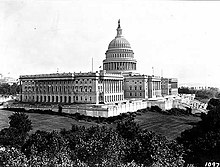Fifty-second United States Congress
| 52nd United States Congress | |
|---|---|
|
51st ←
→ 53rd
|
|

United States Capitol (1906)
|
|
| March 4, 1891 – March 4, 1893 | |
| Senate President | Levi P. Morton (R) |
| Senate Pres. pro tem | Charles F. Manderson (R) |
| House Speaker | Charles F. Crisp (D) |
| Members | 88 Senators 332 Representatives 4 Non-voting members |
| Senate Majority | Republican |
| House Majority | Democratic |
| Sessions | |
|
1st: December 7, 1891 – August 5, 1892 2nd: December 5, 1892 – March 3, 1893 |
|
The Fifty-second United States Congress was a meeting of the legislative branch of the United States federal government, consisting of the United States Senate and the United States House of Representatives. It met in Washington, D.C. from March 4, 1891 to March 4, 1893, during the third and fourth years of Benjamin Harrison's presidency.
The apportionment of seats in the House of Representatives was based on the Tenth Census of the United States in 1880. The Senate had a Republican majority, and the House had a Democratic majority.
The count below identifies party affiliations at the beginning of the first session of this Congress, and includes members from vacancies and newly admitted states, when they were first seated. Changes resulting from subsequent replacements are shown below in the "Changes in membership" section.
TOTAL members: 332
This list is arranged by chamber, then by state. Senators are listed by class, and Representatives are listed by district.
Senators were elected by the state legislatures every two years, with one-third beginning new six-year terms with each Congress. Senators are listed by Senate class numbers, which indicate the cycle of their election. In this Congress, Class 1 meant their term ended with this Congress, requiring re-election in 1892; Class 2 meant their term began in the last Congress, requiring re-election in 1894; and Class 3 meant their term began in this Congress, requiring re-election in 1896.
Members of the House of Representatives are preceded by their district numbers.
Both representatives were elected statewide on a general ticket.
(2 Republicans)
The count below reflects changes from the beginning of this Congress.
...
Wikipedia
